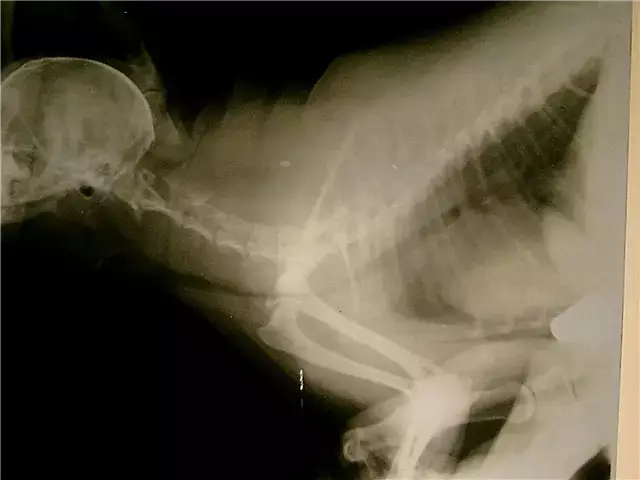- Author Rachel Wainwright wainwright@abchealthonline.com.
- Public 2023-12-15 07:39.
- Last modified 2025-11-02 20:14.
Thyrocomb
Instructions for use:
- 1. Release form and composition
- 2. Indications for use
- 3. Contraindications
- 4. Method of application and dosage
- 5. Side effects
- 6. Special instructions
- 7. Drug interactions
- 8. Analogs
- 9. Terms and conditions of storage
- 10. Terms of dispensing from pharmacies

Thyrocomb is a thyroid drug.
Release form and composition
Dosage form - tablets: round flat-cylindrical shape, with a beveled edge, white (in blisters: 10 pcs., In a cardboard box 2 blisters; 25 pcs., In a cardboard box 2 or 4 blisters; 40 pcs. In a glass bottle, in a cardboard box 1 bottle).
1 tablet contains:
- active ingredients: potassium iodide - 0.15 mg, levothyroxine - 0.07 mg, liothyronine - 0.01 mg;
- auxiliary components: lactose monohydrate, colloidal silicon dioxide, corn starch, glycerol 85%, methyl parahydroxybenzoate, sodium hydroxide, propyl parahydroxybenzoate, magnesium stearate, talc, gelatin.
Indications for use
- euthyroid goiter;
- hypothyroidism;
- prevention of recurrence of goiter after resection of the thyroid gland.
Contraindications
- thyrotoxicosis;
- untreated adrenal cortex insufficiency;
- acute myocardial infarction;
- acute myocarditis;
- angina pectoris III - IV functional class;
- Duhring's disease (dermatitis herpetiformis);
- individual hypersensitivity to the components of the drug.
Care should be taken when prescribing Thyrocomb to patients with pathologies of the cardiovascular system: arterial hypertension, angina pectoris I-II functional class, atherosclerosis, a history of myocardial infarction, heart failure, tachyarrhythmia, tachycardia, as well as malabsorption syndrome, diabetes insipidus, diabetes long-term severe form of hypothyroidism, in old age, during breastfeeding.
Method of administration and dosage
The tablets are taken orally, swallowed whole and washed down with a sufficient amount of liquid. The daily dose is taken once, in the morning, 0.5 hours before the first meal.
The doctor prescribes the daily dose and duration of use individually, taking into account the clinical indications and the results of laboratory tests.
Recommended dosage: initial dose - ½ pc. in a day. Then the dose can be gradually (every 7-14 days) increased until a maintenance dose is reached, which corresponds to the individual need. The usual maintenance dose is 1-2 pcs. in a day.
The period of dose selection and adaptation to it in elderly patients with cardiovascular pathologies, patients with adrenal insufficiency or epilepsy should be increased to 28-42 days or more.
To maintain a stable therapeutic effect, regular intake of the drug is required.
Do not violate the dosage regimen or stop treatment without the advice of a doctor.
Side effects
- possible: development of allergic reactions, increased symptoms of angina pectoris and heart failure;
- very rarely: "iodine" rhinitis in combination with hypersensitivity reactions, exfoliative dermatitis, iododerma, iodine fever, edema of the salivary glands, iodine acne, Quincke's edema.
special instructions
Correctly selected dose reduces the risk of side effects of Thyrocomba. In case of development of undesirable reactions, the use of tablets should be canceled and a doctor should be consulted.
Special recommendations for the treatment of patients with concomitant pathologies:
- heart failure, ischemic heart disease, tachyarrhythmia: frequent monitoring of thyroid hormone levels is required;
- diabetes mellitus, adrenal cortex insufficiency, diabetes insipidus: since the action of the drug can cause an increase in the symptoms of these diseases, it is necessary to carefully select medicines for their treatment;
- hypothyroidism caused by damage to the pituitary gland: in the presence of insufficiency of the adrenal cortex, the use of thyroid hormones should be prescribed after replacement therapy with glucocorticosteroids, this will reduce the risk of developing acute adrenal insufficiency.
Elderly patients should be treated with lower doses.
In children with epilepsy, the use of the drug may increase the number of seizures.
The drug has no effect on the ability to drive vehicles and mechanisms.
Drug interactions
With the simultaneous use of Tireocomba:
- colestipol, cholestyramine, aluminum hydroxide reduce the absorption of the drug, so these drugs should be taken 4-5 hours after hormonal tablets;
- phenytoin, salicylates, dicumarol, clofibrate, furosemide (in a dose of 250 mg) increase the content of thyroid hormones not associated with blood plasma proteins, causing an increase in the effect of the drug;
- phenobarbital, rifampicin, carbamazepine may require an increase in the dose of the drug due to an increase in the clearance of levothyroxine;
- tricyclic antidepressants, indirect anticoagulants increase their effect (their dose may need to be reduced);
- insulin, oral hypoglycemic agents reduce their effect, therefore, at the beginning of hormonal therapy and during the period of correction of the dosage regimen, careful monitoring of the level of glucose concentration in the blood is required;
- potassium-sparing diuretics can increase blood potassium levels;
- cardiac glycosides reduce their effect;
- anabolic steroids, asparaginase, tamoxifen can cause interactions at the level of protein binding;
- estrogen-containing agents increase the level of thyroxine-binding globulin (in some cases, this may require an increase in the dose of the drug);
- somatropin can cause faster closure of the epiphyseal growth zones.
Analogs
Analogs of Thyroxin are: Thyroidin, Thyrotome, Novotiral, L-Thyroxin, Eutirox, Bagotyrox.
Terms and conditions of storage
Keep out of the reach of children.
Store at a temperature of 15-25 ° C, protected from moisture and light.
The shelf life is 3 years.
Terms of dispensing from pharmacies
Dispensed by prescription.
Information about the drug is generalized, provided for informational purposes only and does not replace the official instructions. Self-medication is hazardous to health!






